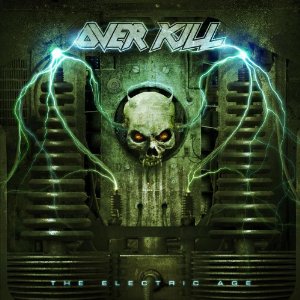 I’m not sure exactly what happened in the past few years and if it is related to the emergence of a new generation of bands emulating the ’80s thrash metal style, but over the past couple of years, many of the originators of the genre have been releasing some of their best albums in years, if not, in some cases, of their careers. While Overkill has always been good at releasing consistently good albums, their last few albums have been some of their best. So, how does their latest release stack up compared to their other recent high quality albums?
I’m not sure exactly what happened in the past few years and if it is related to the emergence of a new generation of bands emulating the ’80s thrash metal style, but over the past couple of years, many of the originators of the genre have been releasing some of their best albums in years, if not, in some cases, of their careers. While Overkill has always been good at releasing consistently good albums, their last few albums have been some of their best. So, how does their latest release stack up compared to their other recent high quality albums?
Formed in the early ’80s and releasing their debut full-length Feel The Fire in 1985, Overkill has been a metal institution for well over three decades now. While they’ve had numerous line-up changes through the years, original members vocalist Bobby “Blitz” Ellsworth and bassist D.D. Verni have steered the band through 15 studio albums of such consistent quality that when Overkill releases a new album, the question is not whether it will be good, average or bad, but whether it will be simply good or great. Much like its immediate predecessor, 2010’s Ironbound, their 16th studio album The Electric Age falls into the “great” category.
Overkill started their career at the forefront of the then blossoming thrash metal scene. Representing the East Coast along with Anthrax and Nuclear Assault, the band separated themselves from their peers with the unique vocals of Bobby “Blitz” Ellsworth and by wearing their Black Sabbath influence on their sleeves a little more than others. This penchant for thrash metal with a touch of doom was best illustrated on their breakthrough album, 1989’s The Years Of Decay. While the album shredded with the best of them, it also wasn’t afraid to slow down the pace and bring some nice ominous doom atmosphere to the proceedings. The unique style of bassist D.D. Verni is what really creates that Sabbath-y vibe in Overkill’s sound and makes their music instantly recognizable as “Overkill”. All due respect to Cliff Burton, but there is a very good case to be made for D.D. being THE best bassist in thrash metal. The Years Of Decay would be Overkill’s last album with the original “classic line-up”, but would certainly not be the last of the band’s best work. The follow-up, 1990’s Horrorscope, while sonically different from its predecessor, was a tremendous effort and would introduce the style that has become the band’s trademark sound since.
Retaining the doom vibe established on The Years Of Decay and their classic thrash sound while mixing in their punk rock influences, Overkill has developed a style instantly recognizable as their own. Since 1999 (almost twenty years after their inception), albums like Necroshine, Killbox 13, Immortalis and Ironbound have proved that the band is just as vital and skilled at their craft as they have ever been. With hooks and riffs galore courtesy of guitarists Dave Linsk and Derek Tailer, the thundering bass of D.D., the skilled drumming of Ron Lipnicki and the inimitable vocals of Blitz, The Electric Age delivers ten blazing tracks of catchy as hell thrash metal that will be stuck in your head instantaneously. One listen through and you’ll be humming “Come And Get It”, “Black Daze”, “Drop The Hammer Down”, “21st Century Man” and “Old Wounds, New Scars” like you’ve heard them countless times before.
Much like Slayer, but slightly more prolific in their studio output, Overkill continues to deal in high quality, consistently good thrash metal. Their fans should be happy to know that while the band hasn’t reinvented the wheel on The Electric Age, they have most certainly delivered another superb effort that is worthy of a spot in your music collection alongside their other classic albums. And those young bands coming out today that are emulating the ’80s thrash scene should certainly be taking notes from the masters of the genre like Overkill on what it takes to deliver some of the best work of your career over 30 years into it.
Grade: A


1 comment
Chris says:
Apr 1, 2012
Good call on this one. I was never a huge Overkill fan (I only owned The Years of Decay), but this is a great, great old school thrash record. Much better than the Anthrax one from last year.